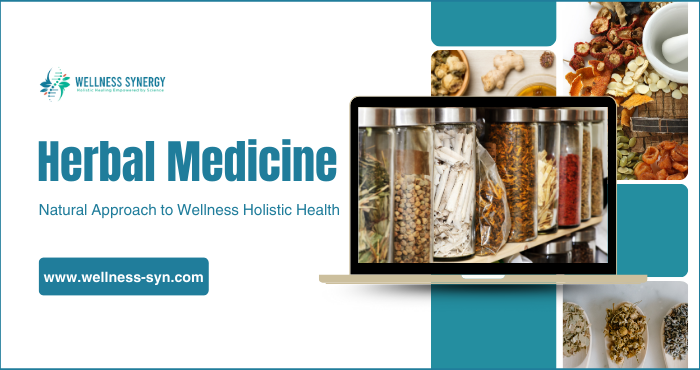Herbal Medicine: A Natural Approach to Wellness Holistic Health
Finding a balance between mental, physical, and emotional health can be tough. Many people are turning to natural, holistic methods to improve their well-being and avoid the side effects of synthetic medications. One popular method is herbal medicine, which has been used for thousands of years. Herbal remedies use the power of plants to help heal the body, offering a natural solution to common health problems.
If you want to live a more balanced and healthier life, holistic practices like herbal medicine can help. In this blog, we’ll explore how herbal medicine can boost your wellness, provide natural alternatives to medications, and guide you toward a healthier, balanced life.
What is Herbal Medicine?
Herbal medicine, also known as phytotherapy, refers to the use of plant-based substances for therapeutic purposes. It involves the use of herbs, plants, and plant extracts to treat or prevent illnesses, improve health, and support overall wellness. Herbs can be consumed in various forms, including teas, tinctures, capsules, extracts, or topical applications. Many modern-day pharmaceuticals are derived from plant compounds, highlighting the power and potential of herbs to heal and restore balance.
How Herbal Medicine Supports Wellness Holistic Health
Wellness holistic health is all about creating balance in all parts of life—mind, body, and spirit. By using herbal medicine, you can improve your physical health, sharpen your mind, and take care of your emotions.
- Holistic Approach to Health:
- Herbal medicine works with the body’s natural processes rather than targeting specific symptoms.
- Supports overall balance, promoting both physical and mental well-being.
2. Adaptogenic Properties:
- Many herbs, such as ashwagandha and ginseng, are adaptogens.
- Help the body adapt to stress, enhance resilience, and support the adrenal system.
- Promote better energy levels and immune function.
3. Digestive Health Support:
- Herbs like peppermint, ginger, and chamomile help with digestive discomfort, bloating, and indigestion.
- Possess antimicrobial and anti-inflammatory properties that promote a healthy gut and microbiome.
- Encourage proper digestion and nutrient absorption.
4. Emotional and Mental Wellness:
- Certain herbs, like lavender, valerian root, and lemon balm, have calming effects on the nervous system.
- Help reduce symptoms of anxiety, insomnia, and stress.
- Herbs like St. John’s Wort are used to alleviate mild depression and improve mood naturally.
5. Detoxification and Liver Health:
- Herbs such as dandelion, milk thistle, and burdock root support the body’s detoxification processes.
- Promote liver health, cleanse the blood, and help flush out toxins.
- Support overall skin health and improve energy levels by detoxifying the body.
6. Support for Immune System Function:
- Many herbs, including echinacea and elderberry, help boost immune system activity.
- Help the body fight off infections and illnesses by enhancing natural defense mechanisms.
7. Anti-Inflammatory and Pain-Relief Properties:
- Herbs like turmeric and ginger are known for their anti-inflammatory and pain-relieving effects.
- Can help reduce chronic inflammation, supporting joint health and easing muscle pain.
8. Improved Sleep and Relaxation:
- Herbal remedies like chamomile, valerian root, and passionflower are traditionally used to promote restful sleep.
- Help regulate sleep cycles and improve the quality of sleep, which is crucial for overall health.
9. Long-Term Wellness and Prevention:
- Herbal medicine offers a sustainable approach to health, addressing the root causes of imbalance rather than just symptoms.
- Supports the body in maintaining wellness over time, preventing illness, and promoting vitality.
Benefits of Herbal Medicine in Wellness Holistic Health
There are numerous benefits to integrating herbal medicine into your holistic health healing routine. Some of the key advantages include:
- Natural and Safe: When used correctly, herbal remedies are generally safe with minimal side effects. They provide a more natural alternative to pharmaceutical drugs, which can come with harsh chemicals and unwanted side effects.
- Prevention Over Treatment: Herbal medicine focuses on prevention by addressing the root cause of illness and promoting overall health, rather than merely masking symptoms. For example, herbs like echinacea strengthen the immune system to prevent colds and flu before they occur, rather than just treating symptoms once you’re sick.
- Support for Chronic Conditions: Many chronic conditions, such as arthritis, diabetes, and cardiovascular issues, can be managed with herbal remedies. Herbs like ginger (anti-inflammatory), cinnamon (blood sugar regulation), and hawthorn (heart health) have been used for centuries to manage chronic ailments naturally.
- Customization for Individual Needs: Herbal medicine can be tailored to an individual’s specific health needs. Whether you’re dealing with digestive issues, sleep problems, or stress, herbal medicine offers a broad range of options that can be customized to your unique needs.
Conclusion
Herbal medicine is a powerful and effective tool in the pursuit of wellness holistic health. It offers a natural, safe, and personalized approach to healing that supports the body’s innate ability to restore balance. By integrating herbal remedies into your daily routine, you can enhance your overall health and wellbeing—naturally.
At Wellness Synergy , we’re dedicated to supporting your wellness journey. Whether you’re seeking natural alternatives to pharmaceuticals or simply want to explore more holistic ways of improving your health, we offer a variety of resources and products to help you thrive.
Disclaimer:
Wellness Synergy, its products, and Dr. Ilka Tamar do not intend to cure, treat, heal, or prevent diseases or illnesses. These statements have not been evaluated by the Food and Drug Administration. The information on our social media and website is for informational purposes only and is not a substitute for medical advice or diagnosis from your physician or other healthcare professional. This information is meant for general wellness purposes and does not claim to diagnose, treat, or cure any illness or health condition. If you suspect you have a medical issue, please contact your physician or healthcare provider.
Frequently Asked Questions about Herbal Medicine
What is herbal medicine?
Herbal medicine, or phytotherapy, involves using plant-based substances such as herbs, flowers, roots, and extracts for therapeutic purposes. These natural remedies can be used to treat or prevent illnesses, support health, and enhance overall well-being.
How does herbal medicine support holistic health?
Herbal medicine promotes balance by working with your body’s natural processes. It supports physical, mental, and emotional health by addressing the root causes of imbalances, not just masking symptoms. This holistic approach encourages wellness in all areas of life, helping you achieve a more balanced state of health.
Can herbal medicine help with digestive health?
Yes! Herbs like peppermint, ginger, and chamomile support healthy digestion by reducing discomfort, bloating, and indigestion. They possess anti-inflammatory and antimicrobial properties that promote gut health and improve nutrient absorption.
How does herbal medicine help with detoxification?
Herbs like dandelion, milk thistle, and burdock root support the body’s detoxification processes by promoting liver health, cleansing the blood, and eliminating toxins. This can improve energy levels, skin health, and overall vitality.
Can herbal remedies support immune system function?
Yes! Herbs such as echinacea, elderberry, and astragalus can boost immune system activity, helping the body fight off infections and illnesses. These herbs enhance your natural defense mechanisms, making it easier for your body to stay healthy.
Can herbal remedies improve sleep and relaxation?
Absolutely! Herbs like chamomile, valerian root, and passionflower have calming properties that promote restful sleep. They can help regulate sleep cycles and improve sleep quality, which is essential for overall health and well-being.
Is herbal medicine effective for long-term wellness and prevention?
Yes! Herbal medicine is focused on long-term wellness by addressing the root causes of imbalance, rather than just treating symptoms. It helps prevent illness, maintain balance, and support vitality over time. Regular use of herbs can enhance your body’s ability to stay healthy and function optimally.
Are herbal remedies safe to use?
When used correctly, herbal remedies are generally safe with minimal side effects. They are a natural alternative to synthetic pharmaceuticals, which often come with harsh chemicals and unwanted side effects. However, it is important to consult a healthcare provider before using herbs, especially if you have existing health conditions or are on medication.


